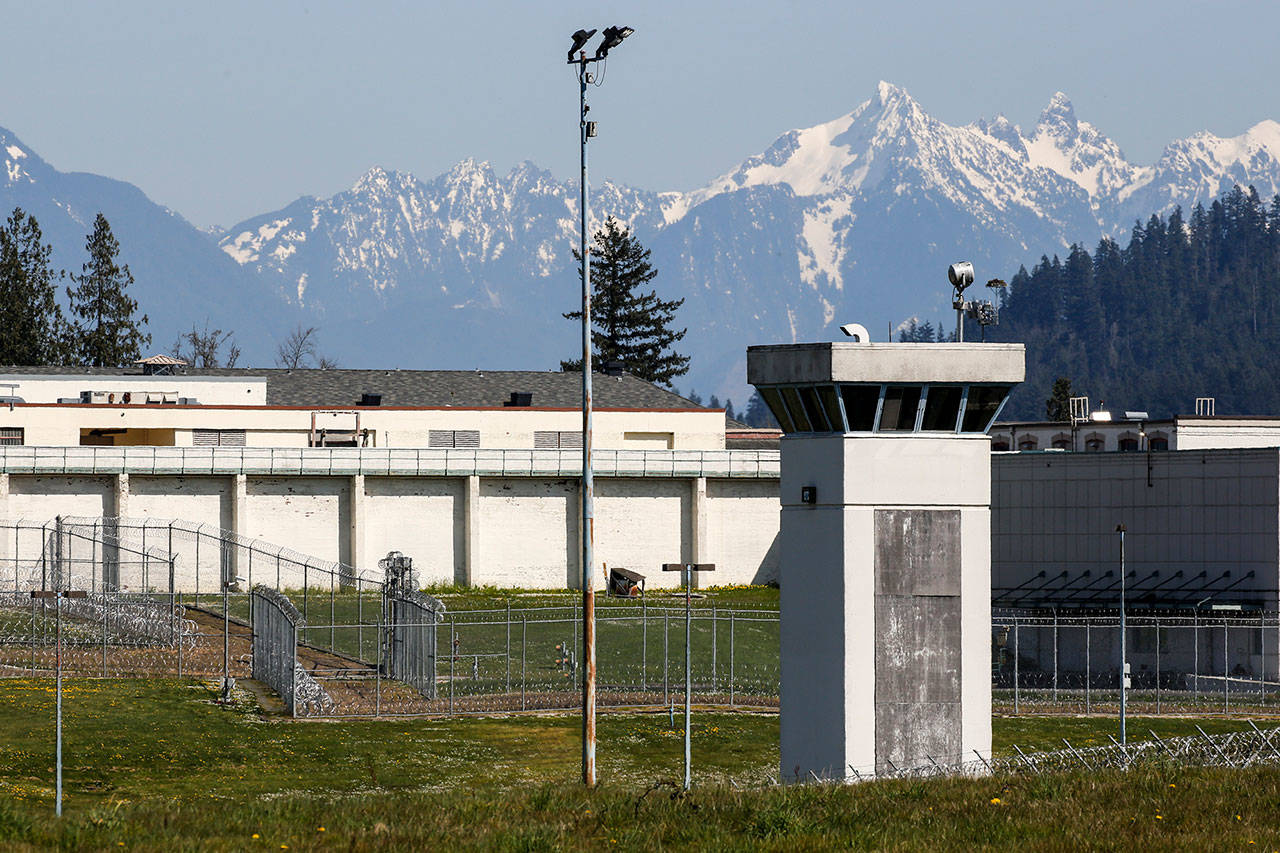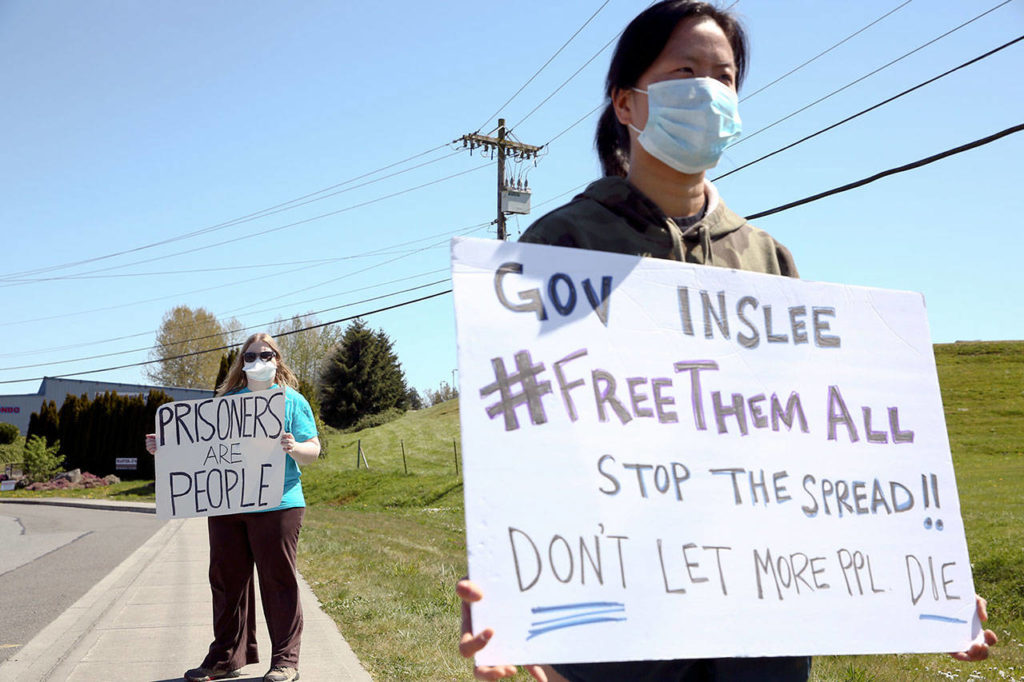By Maggie Quinlan / The Spokesman-Review
COVID-19 cases are spiking in several Washington prisons, with hundreds of new cases reported over the past week.
People incarcerated at Monroe Correctional Complex, now bracing for a second outbreak, are still reeling from the first.
Donna Leroy’s boyfriend is one of 66 inmates who have tested positive for coronavirus in Monroe since the pandemic began. While he sat in isolation during his quarantine in July, Leroy said, her boyfriend did not receive a shower for 10 days.
In that time, she said, he only received a change of clothing once. Rather than getting bottled water, he was drinking from the sink in his cell, Leroy wrote in an email to Michael Obenland, then-superintendent of the facility, on July 29.
“They’re being treated like animals,” Leroy wrote to the superintendent.
Stories like Leroy’s have contributed to an atmosphere of “extreme stress and dread” that has not let up since the first outbreak at Monroe, said Twyla Kill, whose immunocompromised husband is incarcerated in the minimum-security camp there.
With COVID-19 cases surging in other prisons, including one that holds prisoners between transfers, Kill said, inmates at Monroe fear their facility will be next in the new round of outbreaks.
Monroe was the first prison in Washington to endure an outbreak. After the first few cases in April, around 200 inmates rioted.
After eight months, Kill said, the stress is wearing prisoners down.
When asked about the current mood at Monroe, Susan Biller, Department of Corrections spokesperson, wrote in an email: “Though the introduced pandemic protocols is a new way of operating, the population has grown to understand and adjust.”
“Overall, the agency has seen a reduction in operational disruptions and negative behaviors,” Biller wrote.
Isolation
In a report on COVID deaths at Coyote Ridge Corrections Center, staff told the Office of Corrections Ombuds that solitary confinement was “not conducive to healthy recovery” and instead was “a hindrance to self-reporting.”
As of Friday, the Department of Corrections recorded having 394 symptomatic incarcerated people in solitary confinement.
“‘The hole’ is the worst form of discipline used in the prison system,” Kill said, having been incarcerated years ago herself. “It’s cold, it’s dark, it’s silent — you’re stuck in there with your thoughts, and if you’re sick, that’s got to be scary. It’s torture.”
In 2011, a United Nations expert on torture said solitary confinement should be banned as a form of torture that is not rehabilitative.
Kill said she understood the Department of Corrections was “scrambling” when Monroe had the first outbreak in its prison system.
“It’s not a permanent solution,” she said. “Solitary confinement is such a huge factor — nobody with symptoms wants to report them because they don’t want to be put in solitary.”
Kaja Schwartz’s partner dodged COVID-19 at Monroe but contracted it later in work release.
During the first outbreak at Monroe, Schwartz’s partner described corrections officers taking positive-testing inmates into quarantine often around 2 a.m., wearing “hazmat suits.”
Biller confirmed that if the agency receives test results late at night, staff immediately follow medical isolation protocols.
At this point, Schwartz said, inmates were being stripped of their personal belongings and taken to isolation. During the first outbreak at Monroe, “staff were being very cautious due to the unknown of the COVID-19 virus,” Biller said. Now, inmates can bring personal belongings to medical isolation, Biller said.
Inmates losing their possessions “was brought to Headquarters attention,” Biller said. The DOC directed Monroe to let inmates keep their belongings.
In May, Monroe prisoners also told the ombuds they “cannot trust staff for information” about how many inmates had COVID. Instead, they looked for numbers from the news, according to the report.
“Not keeping people informed, it’s almost like a mind game,” Schwartz said.
The ombuds recommended the agency prepare weekly situational reports for all inmates to keep them abreast of COVID-19 cases and protocols inside Monroe. The department has not implemented this but started posting notes from regular calls with inmates’ family members in housing units, Biller said.
In September, the agency directed facilities to let inmates shower after seven days in isolation, Biller said. The first week must “remain highly restricted movement,” Biller said.
During that week, sick inmates are supposed to get basins and hygiene products to clean themselves using sink water in their cells, Biller said.
Access to video visitation is not always available in isolation, Biller said. The department created a mobile phone system in all medical isolation areas, Biller said.
At Monroe, staff also installed televisions in medical isolation cells. Inmates can also request a radio or handheld gaming device at no cost to the individual, Biller said.
Masks and health care
While the ombuds observed 100% compliance in mask-wearing among inmates in May, only 90% of staff complied and some unmasked staff “bunched” together, according to the report.
Kill’s husband is still seeing officers without masks.
“Here’s the thing — COVID-19 has not changed and it isn’t going to. DOC has to change,” Kill said. “It only takes one tiny mistake, one time a guard lets his mask down.”
Before COVID-19, Monroe had received many complaints of poor medical care, according to the ombuds’ annual report.
Monroe and Stafford Creek Corrections Center topped the ombuds’ list of the most frequent sources of complaints in 2020, both in total and per 100 incarcerated individuals, the annual report said.
Last month, the Washington Medical Commission indefinitely suspended the license of the former head doctor at the Monroe Correctional Complex for causing suffering in six inmates, including three who died, in 2019.
When asked how Monroe has addressed ongoing health care issues, Biller said the Health Services Division has “increased training opportunities for medical staff across the state.” Monroe specifically hired a chief of psychiatry to work with the population during the pandemic, she said.
Kill, who is connected with family members of many state prisoners, said she doesn’t see a cohesive plan to address the virus across the state’s prisons.
“The facilities need to be able to accommodate pandemics,” Kill said. “This may not be the last pandemic we have, and the next one might be worse.”
Talk to us
> Give us your news tips.
> Send us a letter to the editor.
> More Herald contact information.


























